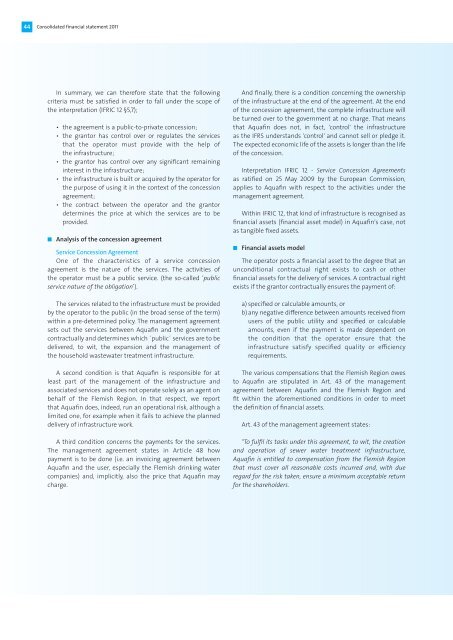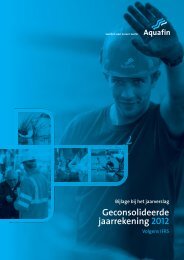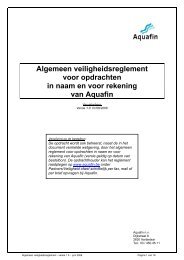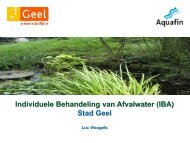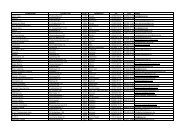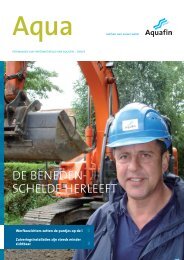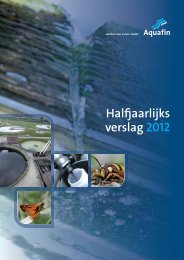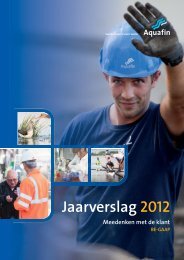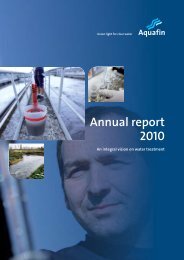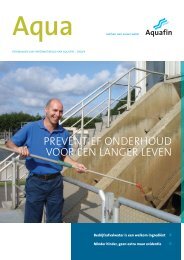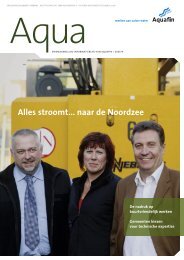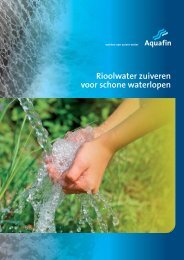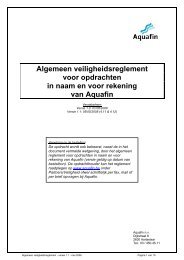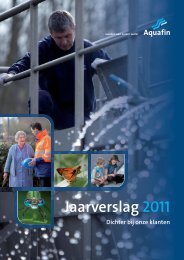Consolidated financial statement 2011 - Aquafin
Consolidated financial statement 2011 - Aquafin
Consolidated financial statement 2011 - Aquafin
You also want an ePaper? Increase the reach of your titles
YUMPU automatically turns print PDFs into web optimized ePapers that Google loves.
44<br />
<strong>Consolidated</strong> <strong>financial</strong> <strong>statement</strong> <strong>2011</strong><br />
In summary, we can therefore state that the following<br />
criteria must be satisfied in order to fall under the scope of<br />
the interpretation (IFRIC 12 §5,7);<br />
n<br />
• the agreement is a public-to-private concession;<br />
• the grantor has control over or regulates the services<br />
that the operator must provide with the help of<br />
the infrastructure;<br />
• the grantor has control over any significant remaining<br />
interest in the infrastructure;<br />
• the infrastructure is built or acquired by the operator for<br />
the purpose of using it in the context of the concession<br />
agreement;<br />
• the contract between the operator and the grantor<br />
determines the price at which the services are to be<br />
provided.<br />
Analysis of the concession agreement<br />
Service Concession Agreement<br />
One of the characteristics of a service concession<br />
agreement is the nature of the services. The activities of<br />
the operator must be a public service. (the so-called ‘public<br />
service nature of the obligation’).<br />
The services related to the infrastructure must be provided<br />
by the operator to the public (in the broad sense of the term)<br />
within a pre-determined policy. The management agreement<br />
sets out the services between <strong>Aquafin</strong> and the government<br />
contractually and determines which ´public´ services are to be<br />
delivered, to wit, the expansion and the management of<br />
the household wastewater treatment infrastructure.<br />
A second condition is that <strong>Aquafin</strong> is responsible for at<br />
least part of the management of the infrastructure and<br />
associated services and does not operate solely as an agent on<br />
behalf of the Flemish Region. In that respect, we report<br />
that <strong>Aquafin</strong> does, indeed, run an operational risk, although a<br />
limited one, for example when it fails to achieve the planned<br />
delivery of infrastructure work.<br />
A third condition concerns the payments for the services.<br />
The management agreement states in Article 48 how<br />
payment is to be done (i.e. an invoicing agreement between<br />
<strong>Aquafin</strong> and the user, especially the Flemish drinking water<br />
companies) and, implicitly, also the price that <strong>Aquafin</strong> may<br />
charge.<br />
And finally, there is a condition concerning the ownership<br />
of the infrastructure at the end of the agreement. At the end<br />
of the concession agreement, the complete infrastructure will<br />
be turned over to the government at no charge. That means<br />
that <strong>Aquafin</strong> does not, in fact, 'control' the infrastructure<br />
as the IFRS understands 'control' and cannot sell or pledge it.<br />
The expected economic life of the assets is longer than the life<br />
of the concession.<br />
Interpretation IFRIC 12 - Service Concession Agreements<br />
as ratified on 25 May 2009 by the European Commission,<br />
applies to <strong>Aquafin</strong> with respect to the activities under the<br />
management agreement.<br />
Within IFRIC 12, that kind of infrastructure is recognised as<br />
<strong>financial</strong> assets (<strong>financial</strong> asset model) in <strong>Aquafin</strong>'s case, not<br />
as tangible fixed assets.<br />
n<br />
Financial assets model<br />
The operator posts a <strong>financial</strong> asset to the degree that an<br />
unconditional contractual right exists to cash or other<br />
<strong>financial</strong> assets for the delivery of services. A contractual right<br />
exists if the grantor contractually ensures the payment of:<br />
a) specified or calculable amounts, or<br />
b) any negative difference between amounts received from<br />
users of the public utility and specified or calculable<br />
amounts, even if the payment is made dependent on<br />
the condition that the operator ensure that the<br />
infrastructure satisfy specified quality or efficiency<br />
requirements.<br />
The various compensations that the Flemish Region owes<br />
to <strong>Aquafin</strong> are stipulated in Art. 43 of the management<br />
agreement between <strong>Aquafin</strong> and the Flemish Region and<br />
fit within the aforementioned conditions in order to meet<br />
the definition of <strong>financial</strong> assets.<br />
Art. 43 of the management agreement states:<br />
"To fulfil its tasks under this agreement, to wit, the creation<br />
and operation of sewer water treatment infrastructure,<br />
<strong>Aquafin</strong> is entitled to compensation from the Flemish Region<br />
that must cover all reasonable costs incurred and, with due<br />
regard for the risk taken, ensure a minimum acceptable return<br />
for the shareholders.


